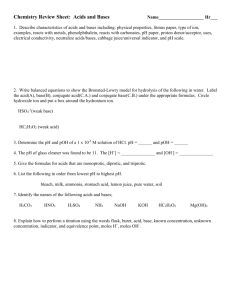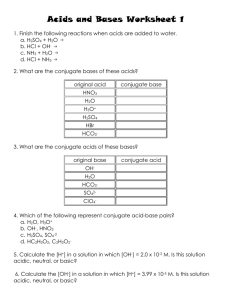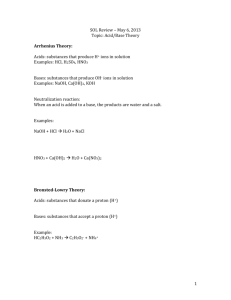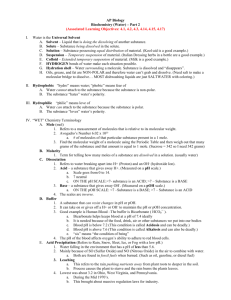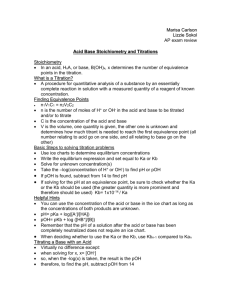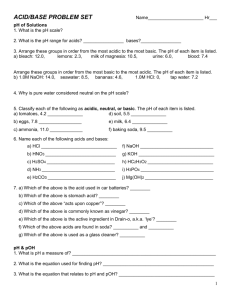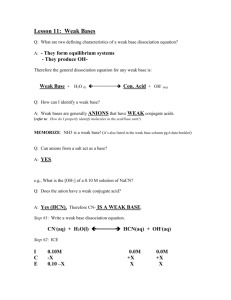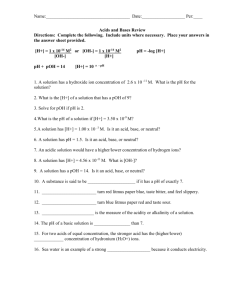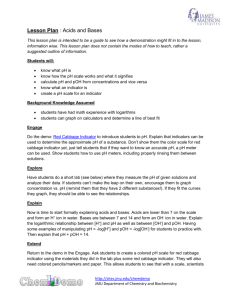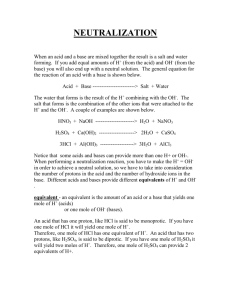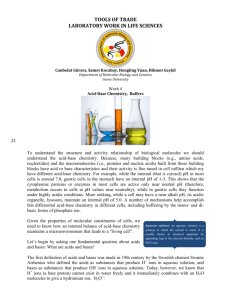Study Guide: Acids and Bases
advertisement
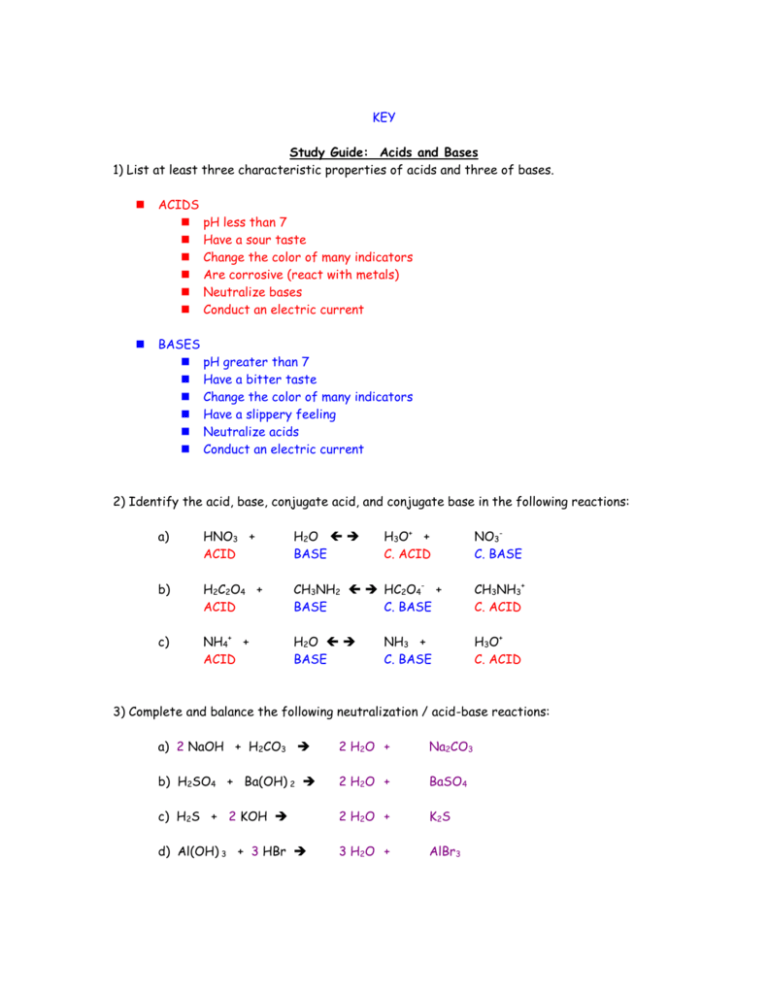
KEY Study Guide: Acids and Bases 1) List at least three characteristic properties of acids and three of bases. ACIDS pH less than 7 Have a sour taste Change the color of many indicators Are corrosive (react with metals) Neutralize bases Conduct an electric current BASES pH greater than 7 Have a bitter taste Change the color of many indicators Have a slippery feeling Neutralize acids Conduct an electric current 2) Identify the acid, base, conjugate acid, and conjugate base in the following reactions: H3O+ + C. ACID NO3C. BASE a) HNO3 + ACID H 2O BASE b) H2C2O4 + ACID CH3NH2 HC2O4- + BASE C. BASE CH3NH3+ C. ACID c) NH4+ + ACID H 2O BASE H3O+ C. ACID NH3 + C. BASE 3) Complete and balance the following neutralization / acid-base reactions: a) 2 NaOH + H2CO3 2 H 2O + Na2CO3 b) H2SO4 + Ba(OH) 2 2 H 2O + BaSO4 c) H2S + 2 KOH 2 H 2O + K 2S d) Al(OH) 3 + 3 HBr 3 H 2O + AlBr3 4) Write a balanced: (1) formula unit, (2) total ionic, and (3) net ionic equation for each of the following acid-base reactions: a) 2 KOH + H2SO4 1) 2 KOH + H2SO4 2H2O + K2SO4 2) 2K+(aq) + 2OH-(aq) + 2H+(aq) + SO42-(aq) 2H2O(l) + 2K-(aq) + SO42-(aq) 3) H+(aq) + OH-(aq) H2O(l) b) HNO3 + Ba(OH)2 1) 2 HNO3 + Ba(OH)2 2H2O + Ba(NO3)2 2) 2H+(aq) + 2NO3-(aq) + Ba2+(aq) + 2OH-(aq) 2H2O(l) + 2Ba2+(aq) + 2NO3-(aq) 3) H+(aq) + OH-(aq) H2O(l) c) H2CO3 + Al(OH)3 1) 3H2CO3 + 2Al(OH)3 6H2O + Al2(CO3)3 2) 6H+(aq) + 3CO32-(aq) + 2Al3+(aq) + 6OH-(aq) 6H2O(l) + 2Al3+(aq) + 3CO32-(aq) 3) H+(aq) + OH-(aq) H2O(l) d) Ca(OH)2 + HCl 1) Ca(OH)2 + 2HCl 2H2O + CaCl2 2) Ca2+(aq) + 2OH-(aq) + 2H+(aq) + 2Cl-(aq) 2H2O(l) + Ca2+(aq) + 2Cl-(aq) 3) H+(aq) + OH-(aq) H2O(l) 5) Given a salt, predict an acid-base pair which would produce the salt: a) Al2(SO4)3 Al(OH)3 + H2SO4 c) CaCl2 Ca(OH)2 + HCl b) NH4F NH4OH + HF d) KBr KOH + HBr 6) Solve the following acid-base titration problems: a) What is the molarity of sodium hydroxide, NaOH, if 59.0 mL of the solution is titrated to the endpoint with 24.0 mL of 0.75 M sulfuric acid (H 2SO4)? (Hint: write the balanced equation first!) NaVa = NbVb (1.5 N)(24.0 mL) = (Nb)(59.0 mL) Nb = 0.61 N = 0.61 M NaOH … or use alternative stoichiometry method b) A 55.6 mL sample of HCl is titrated with 79.9 mL of a 1.25 M solution of NaOH. What is the molarity of the HCl? NaVa = NbVb (Na)(55.6 mL) = (1.25 N)(79.9 mL) Na = 1.79 N = 1.79 M HCl … or use alternative stoichiometry method 7) If you have a 1.0 M solution of NaOH and a solution of HCl with an unknown concentration, explain how you would use titration to determine the concentration of the HCl solution. (Explain the steps) 1) measure out a specific volume of acid of unknown concentration 2) add 3-4 drops of indicator, such as phenolphthalein 3) slowly titrate to endpoint with 1.0 M NaOH 4) record volumes of acid and base needed for neutralization 5) calculate the concentration of the acid 8) Perform the following molarity/normality problems: a) What is the normality of a 5.0 M phosphoric acid (H3PO4) solution? 15 N b) Find the normality of 5.6 g HBr in 450.0 mL of solution. 0.15 N c) If 45.0 mL of 0.30 N H2SO4 are neutralized by 75.0 mL of NaOH, find the normality of the NaOH. 0.18 N d) A 43.7 mL sample of Ba(OH) 2 is neutralized by 33.5 mL of 0.86 M HCl. What is the normality and molarity of the Ba(OH) 2 solution? 0.66 N = 0.33M 9) Calculate the pH and pOH of the following solutions: a) [H+] = 1 x 10-6 M pH = 6 pOH = 8 c) [H+] = 7.4 x 10-8 M pH = 7.1 pOH = 6.9 e) [H+] = 3.22 x 10-3 M pH = 2.49 pOH = 11.51 b) [OH-] = 1 x 10-9 M pH = 5 pOH = 9 d) [OH-] = 9.9 x 10-11 M pH = 4 pOH = 10. f) [OH-] = 5.76 x 10-2 M pH = 12.76 pOH = 1.24 10) Calculate [H+] and [OH-] for the following solutions: a) a solution with pH = 11 [H+] = 1 x 10-11 M [OH-] = 1 x 10-3 M c) a solution with pH = 2.45 e) a solution with pOH = 1.3 [H+] = 3.55 x 10-3 M [H+] = 2.0 x 10-13 M [OH-] = 2.82 x 10-12 M [OH-] = 5.0 x 10-2 M b) a solution with pH = 8.5 [H+] = 3.2 x 10-9 M [OH-] = 3.2 x 10-6 M d) a solution with pOH = 7 [H+] = 1 x 10-7 M [OH-] = 1 x 10-7 M f) a solution with pOH = 12.6 [H+] = 3.98 x 10-2 M [OH-] = 2.51 x 10-13 M
